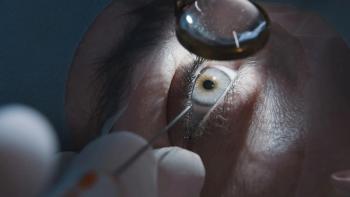
AMD genetic testing could lead to early diagnosis, better treatment
Optometry Times Editorial Advisory Board members Steven Ferrucci, OD, FAAO, and Diana Shechtman, OD, FAAO, discussed the benefits of genetic tests for age-related macular degeneration (AMD) at the American Optometric Association’s Optometry’s Meeting.
Philadelphia-Optometry Times Editorial Advisory Board members Steven Ferrucci, OD, FAAO, and Diana Shechtman, OD, FAAO, discussed the benefits of genetic tests for age-related macular degeneration (AMD) at the American Optometric Association’s Optometry’s Meeting.
The tests detect single nucleotide polymorphisms, also known as SNPs, in a patient’s DNA that have been identified as relating to a high risk of for AMD. If a patient is identified has having a high-risk gene, it could change the path for their treatment, the ODs explained. Instead of jumping from treatment option to treatment option, a test could identify which route will benefit your patient the most, which will save money in the long run, says Dr. Ferrucci.
“The problem with AMD is that you have the genes, but you also have a lot of other complexity to it-diet, smoking, physical activity,” says Dr. Shechtman, and all factors must be considered.
According to the ODs, a non-genetic risk model-age, sex, BMI, smoking, and AMD status-has a predictive accuracy of 78 percent. A genetic model-age, sex, and the results of a genetic test-has a predictive accuracy of 82 percent. But, when you combine both the genetic and non-genetic information, the predictive accuracy is 88 percent-a number Dr. Ferrucci and Dr. Shechtman say they expect to climb to 100 percent as research discovers more predictive genes.
Next: Pros and cons of DNA testing
The test isn’t without its faults, says Dr. Ferrucci. It could provide a false sense of security; cause you to over treat some patients, while under treating others; or cause some patients unnecessary worry. The American Academy of Ophthalmology
But, Dr. Ferrucci says, when treating a patient with AMD, the knowledge of his genetic risk is important. It may lead an OD to counsel the patient more often on losing weight, quitting smoking, and wearing UV protection. The test results may also change the frequency with which an OD sees a patient than she would have without the test. It may give the OD guidance on the type of vitamin supplement to recommend along with any future treatments.
There are two tests available:
“What it comes down to is: would you want to know? Would the results change how you as a doctor manage the patient? Would that knowledge change, in terms of compliance, how the patient behaves?” says Dr. Shechtman.
Newsletter
Want more insights like this? Subscribe to Optometry Times and get clinical pearls and practice tips delivered straight to your inbox.





